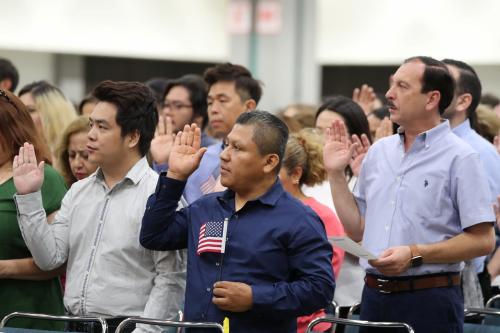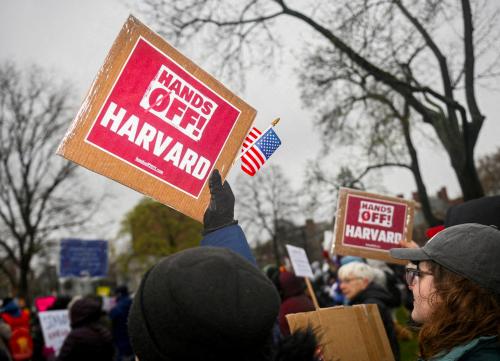In this series, we focus on the role of race, ethnicity, and gender identities in the U.S. judicial branch to discover how descriptive representation can shape education, economic, health and social policies and politics for the next generation.
President Biden has unveiled an ambitious proposal to significantly reform the Supreme Court by pushing for 18-year term limits, which would be a major move away from the lifetime appointments they currently have. The president also stated his support for an ethics code for the Court that would contain an enforcement mechanism and a constitutional amendment that would reverse their ruling earlier this month providing presidents with immunity for actions they take while in office.
The president’s actions are rare, as he is the first sitting president in generations to push for major changes to the Supreme Court, with larger implications for the balance of powers between the three major branches of government. Many activists have been calling for reform following several controversial decisions and growing concern over the influence of outside interests on the decisions of the Court.
This context provides the motivation for our research team at How We Rise to launch a series of blog posts centered on judicial politics and policy, with a particular focus on the role of racial and ethnic representation on judicial outcomes.
An important dimension of this blog series focused on judicial policy is the attitudes of voters toward the Supreme Court. National survey data has made clear that overall approval ratings of SCOTUS have decreased substantially over time, reaching record lows and generating concerns regarding the legitimacy of the Court. However, less is known about variation among voters regarding their views about the Court across demographic sub-groups, including the potential role of race in how voters evaluate the Court. We intend to shed some light on this topic by exploring differences in attitudes toward the Supreme Court across the major racial and ethnic groups in the country.
Is there support for Biden’s reform agenda?
Our scan of relevant survey data suggests that there is support for the overall reform agenda announced by the president. This includes a robust 73% of likely voters that believe the Supreme Court should be required to follow the same ethical code as other federal judges and 77% who support prohibiting Supreme Court justices from receiving gifts valued at more than $50.
There is also strong support (74%) across the electorate for the introduction of term limits for Supreme Court justices (47% strongly support), one of the reforms that is a part of the Biden executive action. Taken collectively, it is clear that most voters will be receptive to the president’s goals of taking action on these items.
Biden’s announcement could have implications for the 2024 race
The potential impact of the president’s announcement regarding reforms to the judicial branch on the 2024 presidential election looms large given the prevalence of public opinion on SCOTUS and some of their decisions as voters headed to the polls in 2022. The 2022 Midterm Voter Election Poll found that a robust 37% of all respondents said that the Supreme Court striking down the right to an abortion and allowing states to enact abortion bans was the primary motivation for their decision to vote in 2022.
There were important differences based on the race and ethnicity of voters in the sample. Black voters were more likely than white voters to state that the Dobbs decision was a primary motivation to vote in 2022, as were Latino (+4%) and Native American voters (+5%).
The survey also asked respondents to reflect on whether any SCOTUS decisions from 2020 to 2022 made them feel either angry, proud, worried, or hopeful. Black and Native American voters were the most likely to report that SCOTUS made them “angry” over that two-year period (both at 30%), with Latino and Native American voters being the most likely to report that these decisions made them feel “worried” (both at 43%). Conversely, one-in-five white voters indicated that the decisions of the Court from 2020 to 2022 made them “proud,” the highest of all racial groups. Similarly, white voters were more likely than Black, Latino, and Native American voters to report feeling “hopeful” about the actions of the Supreme Court over this time period.
With SCOTUS decisions continuing to grab national headlines, Biden’s attention to reform may impact undecided voters and potentially energize young voters to help generate higher turnout. This is much more likely to happen with the recent news that Vice President Harris has signed on to the president’s reform initiative. Given the increasing support among the overall public for some of these reform ideas and the growing dissatisfaction with the Court, this could be the jolt Democrats need to tighten the race as we head down the home stretch.
-
Acknowledgements and disclosures
BSP Research conducted data collection on behalf of UnidosUS for this survey. In addition to his work at Brookings, Dr. Gabriel Sanchez serves as Director of Research for BSP Research.
The Brookings Institution is committed to quality, independence, and impact.
We are supported by a diverse array of funders. In line with our values and policies, each Brookings publication represents the sole views of its author(s).







Commentary
JustEquity and the American judiciary: Can Biden’s Supreme Court reform announcement provide a boost with Democrats?
August 1, 2024